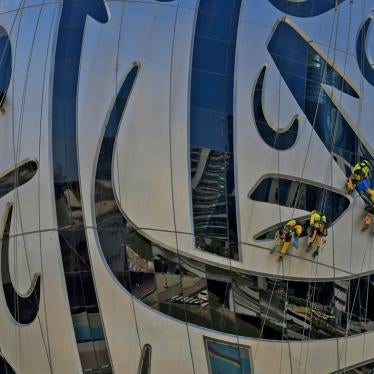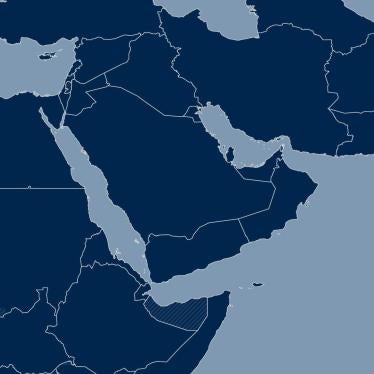(Beirut) – Six months after the 2022 World Cup final in Doha, FIFA and Qatari authorities have failed to provide compensation for widespread abuses, including wage theft and unexplained deaths of migrant workers who prepared and delivered the tournament, Human Rights Watch said today.
Migrant workers who have remained in Qatar have not received compensation for past abuses and face escalating wage theft and new forms of exploitation. This highlights the inadequacies of Qatar’s labor reforms and the shameful human rights legacy of the 2022 FIFA World Cup.
“Qatari authorities and FIFA leaders have repeatedly claimed that existing systems and policies in Qatar protected migrant workers from wage theft and other widespread abuses,” said Michael Page, deputy Middle East director at Human Rights Watch. “But the evidence has once again exposed their misleading claims, which they shamelessly used to deflect criticism when the international spotlight was on Qatar.”
Human Rights Watch spoke to two dozen Indian, Kenyan, and Nepali migrant workers who are either working in Qatar or have returned home in the last year, as well as managers from two labor supply companies, about labor conditions after the tournament. Interviewees said the post-World Cup Qatar labor market has experienced a significant slowdown, leading to major challenges for businesses, especially labor supply companies and construction subcontractors.
For migrant workers, this slowdown has resulted in wage theft, including unpaid salaries and denial of end-of -service benefits. In many cases, workers were asked by employers to wait idly for new work, sometimes for months, without being paid. Some workers told Human Rights Watch their employers prohibited them from changing jobs in anticipation of getting future projects, even when they were not paying or were severely underpaying workers for months.
Neither Qatari authorities nor FIFA have provided remedy, including financial compensation, to migrant workers who faced serious abuses building the tournament infrastructure or to families of migrant workers whose deaths were unexplained.
Before the 2022 tournament, Qatari authorities and FIFA made grossly inaccurate and misleading claims that Qatar’s labor protection systems and compensation mechanisms were adequate to remedy these widespread abuses. For example, both Qatar’s Labor Minister Ali bin Samikh Al Marri, at a November 14 European Parliament hearing, and FIFA President Gianni Infantino, on the eve of the tournament, on November 19, claimed that the Workers’ Support and Insurance Fund would take care of compensation. Al Marri said, “If there is a person entitled to compensation who has not received it, they should come forward and we will help them,” and claimed that Qatari authorities were ready to look at cases from more than a decade ago.
Yet even workers Human Rights Watch interviewed who came forward to the government with evidence of wage theft have not received compensation from Qatari authorities. Three workers said they were owed thousands of US dollars each in end-of-service benefits by their employer, who had FIFA-related projects. They also had company documents stating the amount they were owed, and they conducted multiple follow-ups with Qatar’s labor courts as well as the company management. Two of the workers recently returned to their home countries because while the court ruled in their favor, they could no longer afford to wait in Qatar for the employer to come through with their salaries or the authorities to compensate where the employer has failed to pay.
Many workers have essentially been left trapped in Qatar, fearful of losing large end-of-service benefits owed to them after years of employment if they leave, and are currently unpaid and without work. Many were told by their employers to wait until their company won new projects. One worker said, “My company only engages less than a quarter of over 60 employees. The rest of us just stay in our rooms all day.” The worker, who is owed more than a dozen years’ of end-of-service benefits and unpaid wages that amount to over US$20,000 added, “[This] is not sustainable as I have to send money to my family. I heard that the company is trying to get new projects, but there is no certainty when things will resume.” Another worker, also waiting for his benefits, said the situation is even more difficult when there is a family crisis, such as his wife’s recent health emergency.
Human Rights Watch research has also indicated that employers continue to prohibit migrant workers from transferring jobs despite Qatari authorities’ claims that these restrictions had been removed. Reforms in 2020 removed the requirement for migrant workers to obtain a no objection certificate (NOC) from their existing employer to change jobs. In practice, however, migrant workers are required to obtain signed letters from their employers approving their resignation, which represents a de facto NOC.
Rights and labor groups have long criticized this as one of the key elements of the abusive kafala (visa-sponsorship) system. Moreover, in five cases Human Rights Watch documented, even companies that had not assigned work or paid workers their salaries refused to approve and sign their resignation letters, commonly referred by workers as their “release papers.”
A security guard who has worked in Qatar for seven years said he recently resigned because his employer reduced his monthly salary, citing business slowdown. “He did not give me my release paper when I found a new job, so I decided to quit and returned with only my partial end-of-service benefits,” the guard told Human Rights Watch. An electrician who has not worked for the past month said, “I got a new job, but my company did not give me my release paper, saying they need me when the company starts getting projects.”
This context has discouraged other migrant workers from approaching Qatari authorities for assistance with wage abuses. Five migrant workers told Human Rights Watch they did not file formal complaints, based on the experiences of others. One worker said, “My colleagues who are in a similar situation filed a case against the company, but received no tangible support. You instead face unnecessary difficulty and waste money on travel to the [Ministry of] Labor [department] Office at a time when finances are severely constrained.” Another worker added, “There are many migrant workers in Qatar with ongoing wage abuse cases that require constant follow-up. Even when the court rules in favor of workers after months of follow-up, companies don’t obey court orders and pay workers what they are owed. In this context, I don’t have the motivation to fight a legal battle. Let’s see where my fate takes me.”
One owner of a labor supply company admitted to Human Rights Watch that he has given his workers three options: to stay in Qatar with food and housing provided but with no pay, to switch jobs with their consent, or to go home. He defended his actions saying, “There are very few projects in Qatar now, everything has slowed down. As we wait for the situation to improve, we cannot afford to pay our workforce even their basic salary.” He said that his company’s financial woes are not only due to absence of new projects, but also because he has not received payments for completed projects related to the World Cup. “We ourselves are trapped. How will we pay them?” Previous Human Rights Watch research has shown that companies higher up the supply chain fail to pay subcontractors, leading to insolvency and causing the most harm to workers, who end up subject to wage theft.
FIFA also has failed to address or remedy these serious abuses despite earning a record US$7.5 billion in revenue from the tournament, and the organization has failed to commit to using the estimated US$100 million FIFA World Cup Qatar 2022 Legacy Fund to compensate migrant workers.
On June 5, members of the International Labour Organization (ILO) elected the state of Qatar as president of the 111th session (June 5 - June 16) of the International Labour Conference. This took place despite Qatari authorities’ patent failures to protect labor rights, including that migrant workers cannot join or establish unions. Qatar’s selection came amidst investigations by Belgian authorities into allegations of corruption of members of the European Parliament, a scandal known as “Qatargate.”
“Six months following the end of the 2022 World Cup, compensation for historic wage theft and deaths of migrant workers who delivered the games is nowhere in sight, instead Qatar is presiding over the International Labor Conference and FIFA is enjoying billions of dollars in revenue,” said Page. “It’s disheartening how governments and organizations claiming to advance worker rights are rewarding Qatar as an international labor rights champion instead of focusing their efforts on ensuring migrant workers are protected from abuse and compensated.”








